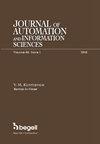ON OPTIMAL CONTROL OF A STOCHASTIC EQUATION WITH A FRACTIONAL WIENER PROCESS
Q3 Engineering
Journal of Automation and Information Sciences
Pub Date : 2021-11-01
DOI:10.34229/1028-0979-2021-6-1
引用次数: 0
Abstract
In recent years, a new direction of research has emerged in the theory of stochastic differential equations, namely, stochastic differential equations with a fractional Wiener process. This class of processes makes it possible to describe adequately many real phenomena of a stochastic nature in financial mathematics, hydrology, biology, and many other areas. These phenomena are not always described by stochastic systems satisfying the conditions of strong mixing, or weak dependence, but are described by systems with a strong dependence, and this strong dependence is regulated by the so-called Hurst parameter, which is a characteristic of this dependence. In this article, we consider the problem of the existence of an optimal control for a stochastic differential equation with a fractional Wiener process, in which the diffusion coefficient is present, which gives more accurate simulation results. An existence theorem is proved for an optimal control of a process that satisfies the corresponding stochastic differential equation. The main result was obtained using the Girsanov theorem for such processes and the existence theorem for a weak solution for stochastic equations with a fractional Wiener process.带分数阶维纳过程的随机方程的最优控制
近年来,随机微分方程理论出现了一个新的研究方向,即具有分数阶维纳过程的随机微分方程。这类过程可以充分描述金融数学、水文学、生物学和许多其他领域中的许多随机性质的真实现象。这些现象并不总是由满足强混合或弱依赖条件的随机系统描述,而是由具有强依赖性的系统描述,并且这种强依赖性由所谓的赫斯特参数调节,这是这种依赖性的一个特征。在本文中,我们考虑了具有分数Wiener过程的随机微分方程的最优控制的存在性问题,其中存在扩散系数,这给出了更精确的模拟结果。证明了满足相应随机微分方程的过程的最优控制的存在性定理。主要结果是利用这类过程的Girsanov定理和分数阶Wiener过程随机方程弱解的存在性定理得到的。
本文章由计算机程序翻译,如有差异,请以英文原文为准。
求助全文
约1分钟内获得全文
求助全文
来源期刊

Journal of Automation and Information Sciences
AUTOMATION & CONTROL SYSTEMS-
自引率
0.00%
发文量
0
审稿时长
6-12 weeks
期刊介绍:
This journal contains translations of papers from the Russian-language bimonthly "Mezhdunarodnyi nauchno-tekhnicheskiy zhurnal "Problemy upravleniya i informatiki". Subjects covered include information sciences such as pattern recognition, forecasting, identification and evaluation of complex systems, information security, fault diagnosis and reliability. In addition, the journal also deals with such automation subjects as adaptive, stochastic and optimal control, control and identification under uncertainty, robotics, and applications of user-friendly computers in management of economic, industrial, biological, and medical systems. The Journal of Automation and Information Sciences will appeal to professionals in control systems, communications, computers, engineering in biology and medicine, instrumentation and measurement, and those interested in the social implications of technology.
 求助内容:
求助内容: 应助结果提醒方式:
应助结果提醒方式:


